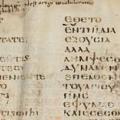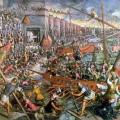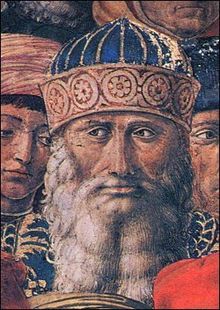325. Platonic Love: Gemistos Plethon
Was Gemistos Plethon, the last great thinker of the Byzantine tradition, a secret pagan or just a Christian with an unusual enthusiasm for Platonism?
Themes:
• W. Blum and W. Seitter (eds), Georgios Gemistos Plethon (1355-1452): Reformpolitiker, Philosoph, Verehrer der alten Götter (Zurich: 2005).
• B. Bydén, “George Gemistos (Plethon), On Aristotle’s Departures from Plato 0-19,” in B. Bydén and C.T. Thörnqvist (eds), The Aristotelian Tradition: Aristotle’s Works on Logic and Metaphysics and Their Reception in the Middle Ages (Toronto: 2017), 267-344.
• V. Hladký, The Philosophy of Gemistos Plethon: Platonism in Late Byzantium, between Hellenism and Orthodoxy (Ashgate: 2014).
• G. Karamanolis, “Plethon and Scholarios on Aristotle,” in K. Ierodiakonou (ed.), Byzantine Philosophy and Its Ancient Sources (Oxford: 2002), 253-82.
• F. Masai, Pléthon et le Platonisme de Mistra (Paris: 1956).
• N. Siniossoglou, Radical Platonism in Byzantium: Illumination and Utopia in Gemistos Plethon (Cambridge: 2011).
• B. Tambrun, Pléthon: Le retour de Platon (Paris: 2006).
• C.M. Woodhouse, George Gemistos Plethon: the Last of the Hellenes (Oxford: 1986).







Comments
Plethon and Bessarion
This was a very impressing episode. But I would like to make an remark:
Plethon had also a well known student. His name was Bessarion. There was a controversy between Bessarion and George of Trapezunt at that time. Bessarion wrote a book which try to harmonize the position of Plato and Aristotle. This was a book which was written against the position of George of Trapezunt if I remember it right. It deals a lot with platonic philosophy. It has the latin title (In calumniatorem Platonem> Against the accusers of Plato). The interesting thing is that we also have a latin text of this book. So Bessarion was able to read latin or write in latin which was not very common among byzantine thinkers. So there is a greek and a latin text of this book. I think it would have been a good idea if Bessarion would have been mentioned in this episode, since he was the student and friend of Plethon. And like Plethon he deals with platonism in his own way. To compare Bessarion and Plethon in this point could have been interesting.
But thanks for this episode!
In reply to Plethon and Bessarion by FriendofByzant…
Wait for it...
Not to fear, Bessarion and Trebizond are getting their own episode! We'll be looking at them and other Greek scholars who went to Italy, in the second episode of the series on the Italian Renaissance (so not far off now).
In reply to Wait for it... by Peter Adamson
Ok, I understand. I didn't
Ok, I understand. I didn't know that Bessarion and Trebizond are getting their own episode (in the series on the Italian Renaissance) . I just thought that it could have been mentioned in this episode that Plethon had also a well known student (like Plato had a well known student etc.). But anyway, I'm looking forward for the coming episode which deal with this subject! I think it's a good idea to make a series on the Italian Renaissance. Maybe one can later compare Plethon and his student with each other.
In reply to Ok, I understand. I didn't by FilippFinkewitz
Return of Plethon
I'm sure I'll be referring back to Plethon in that episode - actually one thing that struck me is that it wasn't so easy to decide whether to put certain figures in the Byzantium part or the Renaissance part which really shows how good it is to cover them in sequence.
In reply to Return of Plethon by Peter Adamson
The coming episodes
I think I can understand your point. It's really not so easy to decide where to put these figures (either in the Byzantium part or the Renaissance part). But in my opinion you already found a good solution for this problem. So I'm looking forward for the coming episodes (especially the one who will deal again with Plethon)!
In reply to Plethon and Bessarion by FriendofByzant…
Bessarion
Came here to make the exact same point, especially after Bessarion & Trebizond were absent from episode 326. Delighted to see they are getting their own episode.
Plethon's Paganism?
I would like to draw your attention to my work ('The Game of Saturn') concerning a late 15th century Ferrarese tarocchi (the Sola-Busca) which embeds a distinctly Hellenistic theurgical ritual grammar amidst its otherwise bizarre (and upon ocassion, grotesque) imagery. Looking for the source of this imagery led me to Plethon's sojourn in Ferrara and his impact on Italian elite intellectual life of the period. If correct it would strongly confirm the supposition that pagan did indeed teach Platonic theurgy and was therefore a practicing as well as intellectual pagan. The work was positively reviewed by Dr Niketas Siniossoglou (in Aries Journal of ESSWE, 2017) and by Dr Joscelyn Godwin (Renaissance Quarterly, LXXI No.2.).
In reply to Plethon's Paganism? by Peter Mark Adams
Plethon
Wow, interesting! Thanks for the reference. I'm additionally struck by our very similar names!
Add new comment